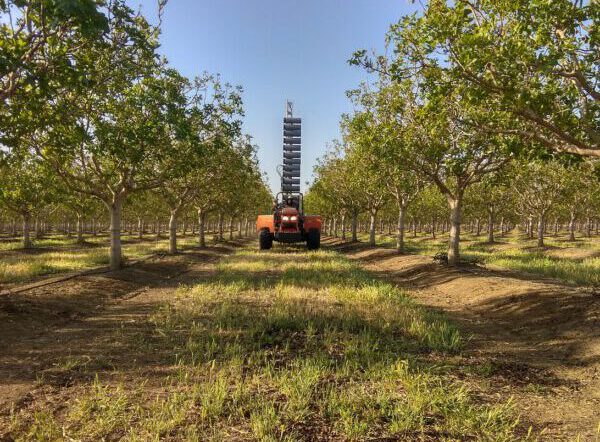In nature, cereals and grasses, olives, dates, pistachios, walnuts, vegetable seeds and more, are wind pollinated
Israeli agri-tech startup Edete Precision Technologies for Agriculture, which has thus far focused on developing a technological solution for artificial pollination of insect-pollinated crops such as almonds, is expanding its services to wind-pollinated crops. They will start with pistachios, one of the world’s fastest growing crops.
As a first step in addressing wind-pollinated crops, Edete conducted the first pilot of artificial pollination of pistachio orchards in California. The pilot was carried out over the course of a week, in an area of over 80 acres, which included young and mature trees. Among other things, the pilot explored the possibility of increasing the yield of young female trees and of securing and increasing the yield of mature orchards.
Wind pollination is carried out in nature on various plants, including cereals and grasses, as well as olives, dates, pistachios, walnuts, some vegetable seeds and more. The effectiveness of natural wind pollination is dependent on the synchronization of the bloom of male and female plants or of different cultivars, meteorological conditions such as temperature, day length, intensity of winds and other environmental conditions including water and soil quality.
Pollination is a delicate and complex ‘’last mile’’ stage in the process of agricultural crop formation, compared to other growth stages, which are assisted by advanced and modern technologies. In most crops, the farmer has no management and control over pollination and yield assurance is at the mercy of nature.
The global pistachio market generates between $6 billion and $9 billion a year. The world’s leading growers are the United States, Turkey, and Iran, followed by other countries including Greece, Italy, Spain, Afghanistan, Syria, China, and Australia.
Edete’s solution starts with the mechanical collection of flowers, separation of pollen from the anthers and other flower parts and producing pure pollen. The company’s proprietary method enables maintenance of good viability rates of pollen stored for over two years.
The best genetically fit pollen is applied on the target trees using the company’s unique autonomous 2BeTM pollinators, which use a combination of technologies to disperse an optimal dosage of pollen on targeted flowers for effective pollination. The 2BeTM mechanical pollinators can work during the day or night and independent of ambient temperature.
Edete’s artificial pollination service has been implemented in the almond sector in Israel and a pollen bank was produced in Australia, using prototypes of mechanical pollinators developed by the company. The company’s technology can also be used to pollinate cherries, apples, and other crops.
Artificial pollination does not depend on flowering synchronization, thanks to the ability to produce and preserve pollen years in advance and disperse pollen at the appropriate flowering times. The artificial pollination is done in a controlled manner that is not dependent on temperature or other environmental conditions.
“After testing our unique automated pollination technology on insect-pollinated crops such as almonds, Edete is bringing its capabilities to the massive market of wind-pollinated crops,” said Keren Mimran, co-founder and VP for Business Development and Marketing at Edete.
Mimran explained: “In recent years, growers have been confronted by an increased asynchrony between the bloom timing of male and female trees. As a result, the yield is reduced, and in extreme cases even result in lack of yield in entire plots. Our technology can and will solve this problem in a manner that helps growers feed the world in the most economical and effective way possible.”
Main Photo: Edete’s automated pollination system in pistachios




















